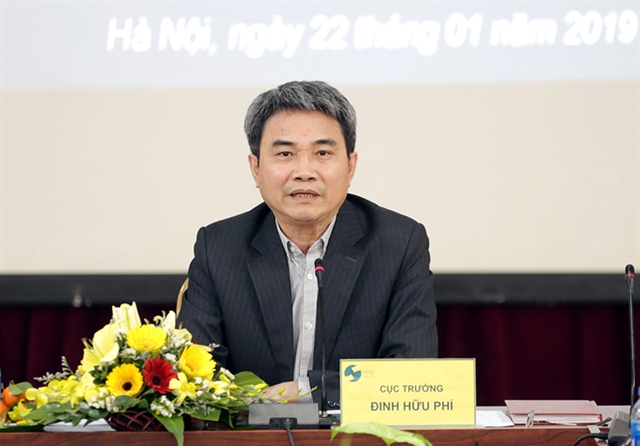
Đinh Hữu Phí. Photo dangcongsan.vn
Đinh Hữu Phí, director general of the Intellectual Property Office of Việt Nam, talks to Hà Nội Mới (New Hà Nội) newspaper about Việt Nam’s efforts to develop its intellectual property law to an international level.
What has Việt Nam been doing to improve intellectual property rights?
The course of socio-economic development and international integration requires Việt Nam to develop a law on industrial property rights, and for owners of those rights to register with authorities.
The Intellectual Property Office of Việt Nam (IPO) was created in 1982 while the Department of Industrial Ownership was created in 1993, and in 2003 the two agencies merged.
The IPO has received almost 654,000 registration for ownership rights and some 43,000 registrations for industrial designs. The IPO has granted almost 363,000 licences.
Do you think 2019 was a successful year for Việt Nam's development of intellectual property rights?
This year was an important milestone in the field of intellectual property rights for Việt Nam. On August 22, the Prime Minister signed Decision 1068 /QĐ-TTg to approve the Strategy for Intellectual Property Rights till 2030. This will serve as a guideline for ministries, sectors and localities to integrate intellectual property rights into all State management activities. This is the first time Việt Nam has adopted a national strategy on intellectual property rights.
At the 14th session of the recent National Assembly, lawmakers adopted a revised Law on Business Insurance and the Law on Intellectual Property Rights. The adoption of the two laws will facilitate conditions for the country to implement the Comprehensive and Progressive Agreement for Trans-Pacific Partnership (CPTPP).
In September, the Ministry of Science and Technology also presented a proposal to revise the Law on Intellectual Property Rights to keep it up to date.
Can you explain a bit further about Việt Nam’s efforts to amend some of its laws relating to intellectual property rights to meet the requirements of international integration?
The issuance of the Law on Intellectual Property Rights in 2005 has helped Việt Nam form a good legal system in this area and helped Việt Nam join the WTO and integrate more successfully on a global scale.
The CPTPP and EU-Việt Nam Free Trade Agreement will have strong impacts on the Vietnamese economy and its intellectual property rights.
In acknowledgement of Việt Nam’s contributions in the field of intellectual property rights, the Vietnamese Ambassador to the United Nations was elected President of the World Intellectual Property Organisation, while the Director General of the Việt Nam Intellectual Property Office is now Chairman of the ASEAN Working Groups on Intellectual Property Co-operation for the 2019-21 tenure.
What can the IP Office do to contribute to economic development, culture and society?
Intellectual property rights in Việt Nam have become an important catalyst for the country’s socio-economic development. The ministries of Science and Technology; Culture, Sports and Tourism and Agriculture and Rural Development have sat down together to revise the current Law on Intellectual Property Rights. The draft revised law has been posted on the Government Portal for public comments and suggestions.
(Source: VNS)